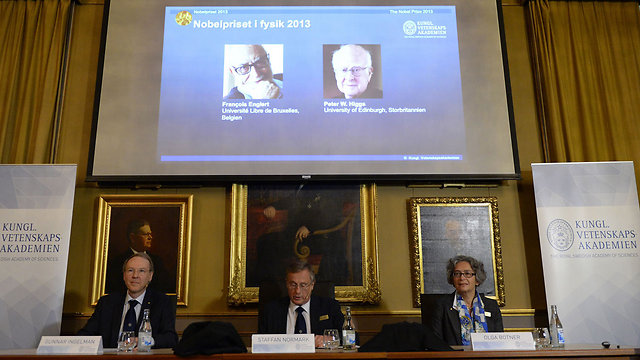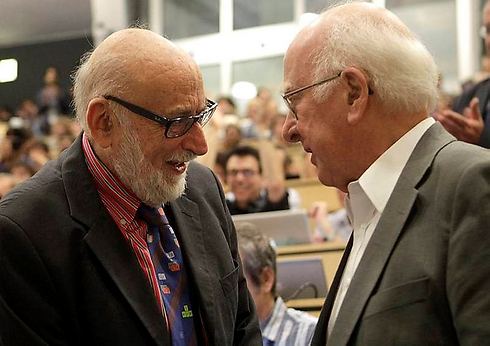Shoah survivor shares Nobel in physics
Jewish Belgian Prof. François Englert, 81, grew up in Nazi-occupied Europe, married Israeli woman, serves as professor at Tel Aviv University. Nobel Committee awards him with prestigious prize for theory of how particles acquire mass, together with Scottish Prof. Peter Higgs, who is known as Israel boycotter
Video courtesy of jn1.tv
In 1964, Prof. François Englert, 81, and Prof. Peter W. Higgs, 84, proposed the theory independently of each other. In 2012, their ideas were confirmed by the discovery of a so-called Higgs particle at the CERN laboratory outside Geneva in Switzerland.
The awarded theory is a central part of the Standard Model of particle physics that describes how the world is constructed.
The entire Standard Model also rests on the existence of a special kind of particle: the Higgs particle. This particle originates from an invisible field that fills up all space. Even when the universe seems empty this field is there. Without it, we would not exist, because it is from contact with the field that particles acquire mass. The theory proposed by Englert and Higgs describes this process.

Nobel Committee announces winners (Photo: AFP)
On Tuesday, the two scientists received the greatest recognition the world has to offer when the Nobel Prize Committee in Stockholm declared them the recipients of the 2013 Nobel in Physics. The committee mentioned another physicist, Englert's colleague Prof. Robert Brout, who will not receive the prize due to his death two years ago.
The Belgian Prof. Englert is considered one of the greatest physicists alive today. He grew up as a Jewish boy during the Nazi occupation of Europe and serves as a Sackler Professor by Special Appointment in the School of Physics and Astronomy at Tel Aviv University.
Englert has many friends in Israel. He met his current wife, Mira, in Jerusalem through two of his best friends: Writer and former journalist Ruth Yardeni Katz and her husband the physicist, Prof. Yossi Katz of the Hebrew University.
"François and I studied engineering in Brussels together, and the two us were pretty bored by it," Prof. Katz said Tuesday. "Over the years each of us went back to studying physics, and that's how we met again. We have been friends since then."
Admires Israeli mind
In 2004, Englert and Higgs co-won the prestigious Israeli Wolf Prize in physics, and that’s when the differences between them in regards to Israel became apparent. Following the assassination of Hamas leader Sheikh Ahmed Yassin, the Scottish Prof. Higgs refused to come to Israel to receive the prize.
As strange as it may sound, although they have been working simultaneously and together on their theory, the two professors met for the first time only a year ago.

Englert and Higgs. Met for first time only one year ago (Photo: EPA)
Speaking from his home on Tuesday night, Englert said he was exhausted from all the phone calls and congratulations. In a meeting I held with him several months ago after a lecture he gave at the School of Physics and Astronomy at Tel Aviv University, the professor told me he admired the Israeli mind.
"The intellectual level in Israel is very high, and I am getting to know it through the lectures and seminars I deliver at the Hebrew University and at Tel Aviv University," he said. "I have worked with talented Israeli physicists, and I love the weather and special atmosphere in Tel Aviv and Jerusalem."
Prof. Aharon Casher, Englert's friend and colleague, said Tuesday that the new Nobel laureate was an extraordinary person. "He is one of the smartest people I know, and he has a sharp and unusual sense of humor," he noted. "The work he, Higgs and Brout have done based everything we know in modern physics."
Prof. Eliezer Rabinovici of Hebrew University, another friend of Englert, recalled a lecture he had heard from him at the beginning of his career. "When I was an MA student in physics at the Hebrew University, I heard the young bearded Belgian scientist lecture about his groundbreaking work," he said. "Englert was not thinking about the prize at the time. He was filled with enthusiasm and was focused on educating us."
Prof. Rabinovici, who serves as chairman of the Israeli Committee for High Energy on behalf of the national Academy of Sciences, which is in charge of relations with the European Organization for Nuclear Research (CERN), said that this year's recipients should have already won the Nobel in physics last year.
"I agree with them and I am happy about the decision. Justice has been made," he said. "Nonetheless, the real heroes of the discovery of the particle are the thousands of experimental physicists, who thanks to their decades-long diligence ideas could be converted into reality. We all take our hats off to them – this is their day."















